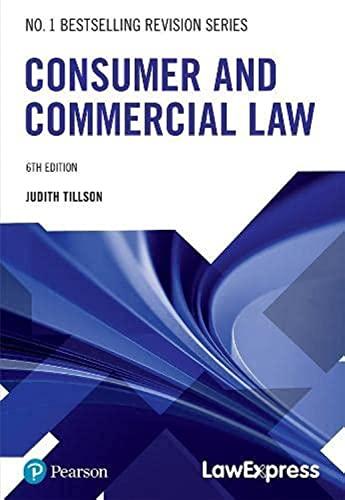Question
Q1. Bowers distinguished civil rights from civil liberties in the United States by referring to the latter as negative restraints of government exercise of its
Q1. Bowers distinguishedcivil rightsfromcivil libertiesin the United States by referring to the latter as "negative restraints" of government exercise of its powers.The following are examples of civil liberties, EXCEPT
A. the right to keep and bear arms.
B. the right to fair and equal legal representation.
C. the right to be free from bills of attainder.
D. the right to peaceably assemble.
Q2. Like the Native Americans in Nevada, African Americans "were discriminated in various ways and never treated as full equals," with the amount of discrimination rising in relation to their rise in numbers living in Nevada in the 1930s and 1940s.The following reflected the types of discrimination experienced by African Americans, with the EXCEPTION that they
A. were denied as customers to gamble, eat, drink, and attend shows in the state's various casinos and restaurants; in addition to being denied equal access to housing.
B. were subject to Jim Crow laws requiring public accommodations to provide "separate but equal" access.
C. experience education disparities, evident in the low proficiency exams of African American students in relation to other groups.
D. experience higher percentages of incarceration in relation to other ethnic groups
Q3. The driver(s) of Hispanic immigration into Nevada was
A. government expenditures
B. all answers
C. opportunity
D. political oppression
Q4. Along with the other 49 states, women in Nevada experienced barriers in their efforts to overcome social, economic, and political disparities, as well as some advances, including the following, with the EXCEPT that
A. or every $1.00 earned by a male working in Nevada, women earned $0.82.
B. women are making inroads holding state and local elected offices
C. about a third of high paying administrative jobs were held by women; while nine out of ten lower average paying secretarial support positions were held by women.
D.Nevada was one of the few successful states that ratified the Equal Rights Amendment.
Q5. In relation to other states, Bowers noted that over the last two decades, Nevada demonstrated a liberal approach developing anti-discrimination policies toward the lesbian, gay, bisexual, and transgender communities.Which of the following is NOT an example of an effort to overcome discrimination against the LGBT community in Nevada?
A. Nevada granted the ability for gay and lesbian couples to marry.
B. The state legislature passed a law allowing hospital patients to elect who their visitors could be, which encompassed gay and lesbian couples.
C. the state legislature passed bills protecting the rights of transgendered individuals to the extent that such rights were enjoyed by lesbian and gay individuals, covering anti-discrimination in public accommodations, housing and property transactions, protection from workplace discrimination, in addition to hate crimes protection.
D. Nevada repealed its anti-sodomy law as well as adding sexual orientation to the state's hate crimes statute.
Q6. During the Great Depression, the U.S. Supreme Court's jurisprudence began "incorporating"civil liberties provided in the federal Bill of Rights and applying them to the states, using the due process clause of the Fourteenth Amendment to the U.S. Constitution.
A. True
B. False
Q7. The U.S. Supreme Court's precedent inBarron v. Baltimoreheld that the 23 civil liberties enumerated in the Bill of Rights were not applicable to the individual states; yet the Declaration of Rightsor Article 1 in Nevada's state constitutionlargely replicated those provisions of the Bill of Rights to protect state citizens from a potentially overzealous state government.
A. True
B. False
Q8. In his opening discussion on his chapter dealing with civil rights and liberties in Nevada, Bowers laments Nevada's treatments of non-whites as less than ideal, a mixed record, pitiful; that the state's historical record protecting the civil rights of its people would not suggest the behavior of an enlightened citizenry and/or its government.
A. True
B. False
Step by Step Solution
There are 3 Steps involved in it
Step: 1

Get Instant Access to Expert-Tailored Solutions
See step-by-step solutions with expert insights and AI powered tools for academic success
Step: 2

Step: 3

Ace Your Homework with AI
Get the answers you need in no time with our AI-driven, step-by-step assistance
Get Started


